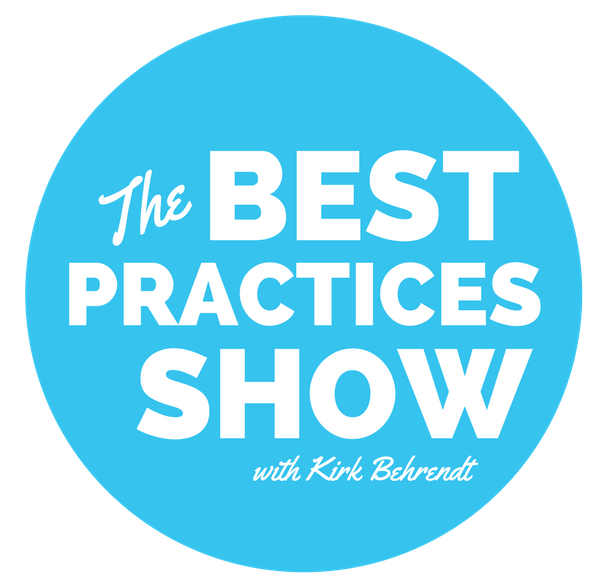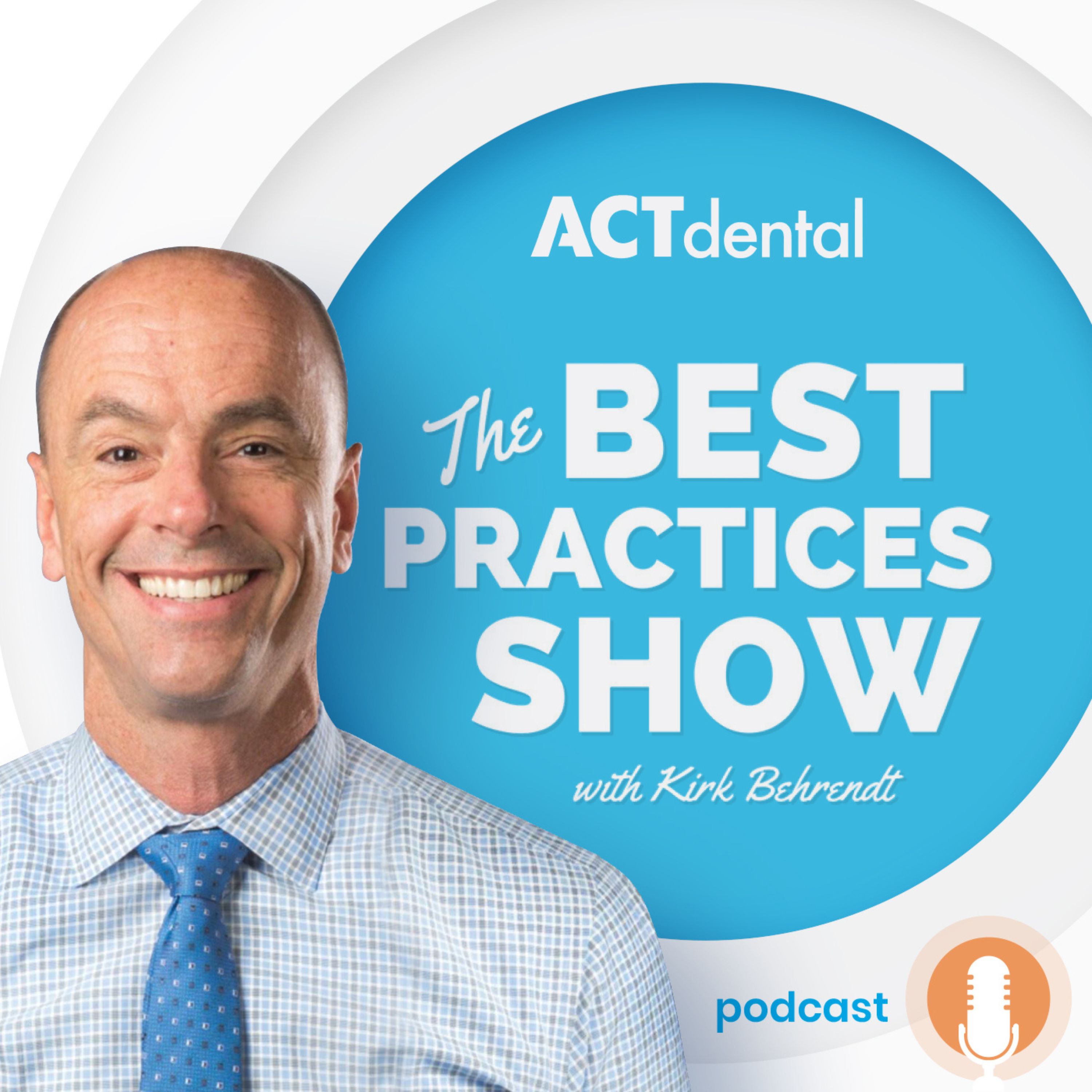Episode 315
315: Seeing the Clinical/Technical Reality - Dr. Bob Winter
Seeing the Clinical/Technical Reality
Episode #315 with Dr. Bob Winter
There is a lack of communication between dentists and the lab. And to explain why that is and how to close that gap, Kirk Behrendt brings in Dr. Bob Winter for his insight into both the clinical and technical sides of dentistry. Keeping standards and expectations high is great — but keep them grounded in reality! For more advice on communicating effectively, listen to Episode 315 of The Best Practices Show!
Main Takeaways:
Dental students aren't taught how to communicate and interact with dental labs.
Because of this, there's a lack of effective communication between the two.
Dentists expect perfection from the lab without communicating effectively.
Dentists should make an effort to find the right dental lab to collaborate with.
Learn to diagnose and treatment plan comprehensively.
Technology helps simplify things but isn't a panacea.
You still have to think analog in order to use digital technology.
Digital isn't a prerequisite to becoming a quality dentist.
Quotes:
“In dental school, we learn a lot of basic concepts. And then, when we get into a practice, we’ve learned a lot of clinical steps. But unfortunately, in most schools, we don't learn a lot about the communication and interaction with dental laboratories. We just expect certain outcomes, and yet we don't communicate very effectively with dental laboratories. We just expect perfection, and we don't know how to interact and communicate because we’re not taught that in school.” (09:56—10:35)
“Today’s technology is evolving so quickly because of the digital world, whether it’s digital photography or even things like we’re doing right now. We can communicate with individuals around the world, real-time. So, [technology] simplifies things, but it’s not necessarily the panacea that solves our problems. And in the digital world, there are some current weaknesses in how it relates to the traditional analog world. And so, I'm just super excited to see all of it evolve. And hopefully, sooner than later, there's a seamless transition from analog to 100% digital.” (12:05—12:47)
“The only thing that makes me, as a specialist, a prosthodontist, different than anyone else is, I'm trained to look at patients comprehensively and to diagnose and treatment plan comprehensively. When it comes to procedures I do, it’s not different than any restorative person. So, it’s all about seeing the patient in a holistic manner and comprehensively. And in dental school, they get a reasonable exposure to that. But once you start seeing patients, you realize it goes beyond one tooth, or two teeth, or three teeth, or quadrants; it’s full-mouth evaluations.” (13:23—14:07)
“We can treat individual teeth fairly predictably. But when you see people with debilitated dentition, severely worn dentitions, multiple missing teeth, then looking at the big picture and understanding comprehensively what the needs are, I think, is the key.” (14:21—14:42)
“Unfortunately, there's a lack of effective communication between the dentist and dental laboratory. If you look at the percentage of prescription forms that are completely filled out, or at least to get enough information to do the cases comprehensively, it’s lacking. So, the expectations are really high of what you want in return, but the upfront communication is lacking.” (15:25—15:53)
“Many dentists, the more comprehensive cases, they want the technicians to solve the problems. But the dentist has to realize technicians do not have a dental training background. They can look at photos, they can look at mounted casts, and they can look at how you make the nuts and bolts work. But it’s still relying on the dentist’s clinical skills and understanding to help really definitively drive the treatment plan.” (16:12—16:41)
“The key is making the effort in finding the right laboratory that's willing to collaborate. And again, there're all kinds of laboratories, just like there’re all kinds of dentists. If the laboratory is on a good enough level and just trying to match your shade tab and send it out the door, they're doing higher volume, that's one approach. And it may service a lot of people well. But if you're trying to elevate your outcomes to patients, then you have to work with laboratories that want to put a little bit more effort into that collaboration. And that can certainly be found around the country where the digital world allows us to do that more effectively.” (18:09—18:53)
“If you look at remakes in laboratories, the most common is shade. But after shade, it’s getting into the fit of the restoration. And the reason I'm mentioning this at the moment, it’s almost like a black-and-white issue. Either you can see the margin, or not. And those people working digitally have an opportunity to blow the image up on their monitor and try and discern the margins. And they can easily mark their margin and take the responsibility for their preparation finish line, where in the analog where you're working with silicone impressions and stone models, classically, the dental technician has to find the margin, mark the margin, and make the restoration to that.” (20:18—21:03)
“I look forward to the day where the accuracy of printed models is the same as a polyvinyl impression in a stone model. So, I think that can revolutionize dentistry, honestly. And we’re getting closer. But that's maybe the weak link, so understanding of that, I think, is essential.” (22:16—22:37)
“At the end of the day, I always say that you have to think as an analog dentist in order to use the digital technology. At least, it helps immensely. So, the more you learn on the analog side of things, because currently, we still have to use our hands and our brains to prep teeth and take impressions and do things like that.” (23:32—23:56)
“I'm all for digital. I'm all for learning it. But you don't have to do that to become a quality dentist. If you're coming out of school, younger individuals, learning and doing the traditional approach is still a great option. It’s been the standard of care for a long time, and there's nothing wrong with doing that.” (24:58—25:20)
“Keep your thoughts and expectations grounded in reality. I always talk about my perfect world, ‘If I have a perfect world, I would do this, this, this, and this, and have this outcome.’ But we realize that there is no perfect world, so you have to be grounded in the reality of what's currently available. And if you're challenged by certain things that you're getting back technically working with a dental laboratory, troubleshooting and trying to grow together as a team is important, and being grounded in the expectations of what's possible. Always shoot for the stars and always evolve and grow and develop, yet still grounded in the reality of what's current today.” (30:39—31:37)
Snippets:
Dr. Winter’s background. (02:59—04:23)
How he got involved in the clinical and technical sides of dentistry. (04:44—07:30)
How he got to California from Milwaukee. (07:37—09:27)
Why this is an important topic in dentistry. (09:55—11:26)
Technology simplifies things but isn't a panacea. (11:39—12:47)
Biggest challenges for young dentists. (13:07—14:42)
It’s all about effective communication and collaboration. (15:18—16:48)
Find the right dental labs. (17:47—18:53)
Discrepancies between clinical and technical realities. (19:16—22:37)
Advice on digital versus analog. (23:13—25:20)
It’s the thinking that gets polished, not so much the hands. (25:59—27:55)
The future of this aspect in dentistry. (28:25—30:21)
Last thoughts on the clinical and technical reality. (30:36—31:37)
Dr. Winter’s lab and courses at Spear Education. (31:57—35:33)
Reach Out to Dr. Winter:
Dr. Winter’s website: https://winterdds.net/
Dr. Winter’s Facebook: https://www.facebook.com/robert.winter.796
Esthetics by Design: https://ebdlab.com/
Dr. Bob Winter Bio:
Dr. Winter graduated in 1981 from Marquette University School of Dentistry. In 1983, he completed his Prosthodontic Specialty Residency in Milwaukee, Wisconsin, at the VA Medical Center. Since 1983, he has maintained a private practice limited to prosthodontics and a commercial laboratory specializing in highly esthetic restorations. In addition, since 1984, he has taught clinical and technical courses worldwide to dentists and dental technicians. Dr. Winter is a principle instructor at Spear in Scottsdale, Arizona, the world’s largest private continuing dental education facility.
He is a Past President of the American Academy of Esthetic Dentistry where he remains a member and is a member of the American Academy of Restorative Dentistry and the American Dental Association. Dr. Winter is a member of the graduate prosthodontics faculty at the University of Washington and the University of Southern California, and is on faculty at Midwestern University College of Dental Medicine in Phoenix, Arizona.
Having taught more than 900 didactic, clinical, and technical courses in over 40 countries, Dr. Winter is recognized around the world as a premier clinician, dental technologist, and master ceramist. This unique blending of disciplines and talent continues to keep him in high demand as an educator and speaker. Dr. Winter sits on the advisory boards for the Journal of Esthetic and Restorative Dentistry, The International Journal of Periodontics & Restorative Dentistry, and the International Journal of Implant Dentistry. He is involved in research and product development pertaining to new dental materials.
Dr. Winter has a line of specific preparation design burs developed for Brasseler USA, and was a co-developer of d.SIGN® dental ceramic for Ivoclar-Vivadent. In 1991, he was the second recipient of the Gordon Christensen Lecturer Recognition Award for Excellence in Restorative Education. In 2005, Dr. Winter was named Marquette University School of Dentistry Distinguished Alumni of the Year. In 2018, Dr. Winter received the inaugural Distinguished Lecturer Award from the prestigious American Academy of Esthetic Dentistry.


